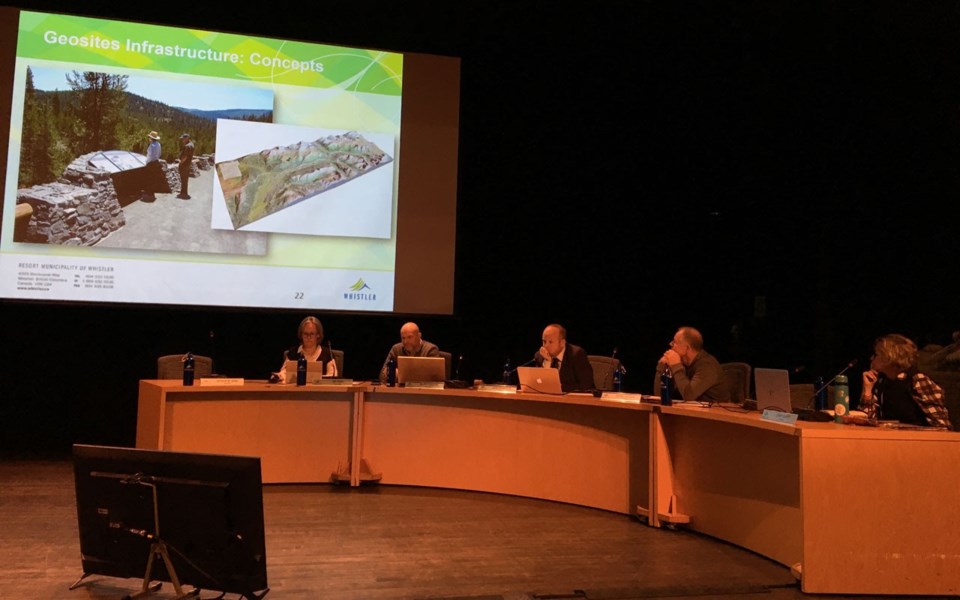The Resort Municipality of Whistler (RMOW) is hoping to shine a brighter light on the Sea to Sky's eclectic and dynamic natural environment via a United Nations Educational, Scientific and Cultural Organization (UNESCO) Global Geopark designation.
At its Jan. 22 meeting, council approved a grant application for $962,336 to the Canada-British Columbia Investing in Canada Infrastructure Program to help pay for the $1.3-million project.
According to UNESCO, a geopark is a "single, unified geographical area where sites and landscapes of international geological significance are managed with a holistic concept of protection, education and sustainable development."
There are 136 worldwide, and only three in Canada (Tumbler Ridge became the first and only geopark in B.C. in 2014).
In Whistler's case, it would begin with a "nucleus" of five sites (of a potential 55 identified) connected by and accessed from the Sea to Sky Trail: The Cheakamus lava escarpment, Loggers Lake, Basalt features near Cal-Cheak north and south, glacier views from Green Lake and the Mystery Creek rockslide.
The proposed geopark would cover about 2,500 square kilometres, said manager of cultural planning and development John Rae, in a presentation to council.
"It's a dynamic landscape which really captures the interplay of volcanism, glaciation and plate tectonics, the unique landforms, and also the physical human geography that's occurred as a result of that," Rae said.
The project will include the installation of interpretation materials, as well as trail improvements and infrastructure like boardwalks and viewing platforms.
Visitors to the park will be able to use a free app accessible on any smartphone to see detailed map descriptions, watch interpretive video vignettes and even interact with augmented reality software.
The hope is that residents will develop a deeper understanding of Whistler's unique sense of place, which they can then share with visitors to the geopark.
"It also attracts a more purposeful traveller, someone who wants to experience a destination in its entirety ... not just checking a box," Rae said.
"And it's also, quite simply, a diversification of our tourism economy. It's attracting new clientele, (and) it's not weather-dependent."
While the geopark has been an RMOW solo effort to this point, the project is a corridor-wide initiative that will include partnerships with local First Nations, the provincial government and communities throughout the corridor, Rae said.
If the grant application is approved, council will have to decide if it wants to commit the remaining $350,000 to the project—a number Councillor Ralph Forsyth said he (respectfully) wasn't ready to support.
"My reasons are I fear the ongoing liability of cost," he said.
"We have a budget workshop coming up tomorrow, and I don't want to spend the $350,000."
There is currently no budget for the ongoing maintenance costs associated with the project, Rae said, but the costs would mostly be back-of-house, related to the "digital infrastructure" of the park.
The physical infrastructure would be taken into the RMOW's existing asset management program.
The RMOW committed $50,000 to explore the project in 2018, along with another $50,000 in 2019 and $25,000 in each of the three years after that.
The geopark designation doesn't come with any change to legislation in terms of ecological protection, and is also not to be confused with the Howe Sound Biosphere Region Initiative, which is seeking to have the Howe Sound region designated by the United Nations as an UNESCO Biosphere.
"Would this be connected at all? Are they competing for the same dollars?" asked Coun. Cathy Jewett.
"How would we cooperate with them to make sure that this would be something that would be good for the whole region?"
Rae said he's been in contact with Ruth Simons of the biosphere initiative, and that both parties feel the projects are complementary endeavours.
"And they are actually slightly different, because the biosphere reserve ends up actually having restrictions on it, and it's actually more of a protective exercise, as opposed to an actively engaged exercise," he said, adding that most of the envisioned geopark falls outside of the proposed boundaries of the Howe Sound Biosphere Initiative.
Whistlerites will get their first look at the 2019 budget—including a list of proposed projects—at an open house next month.




